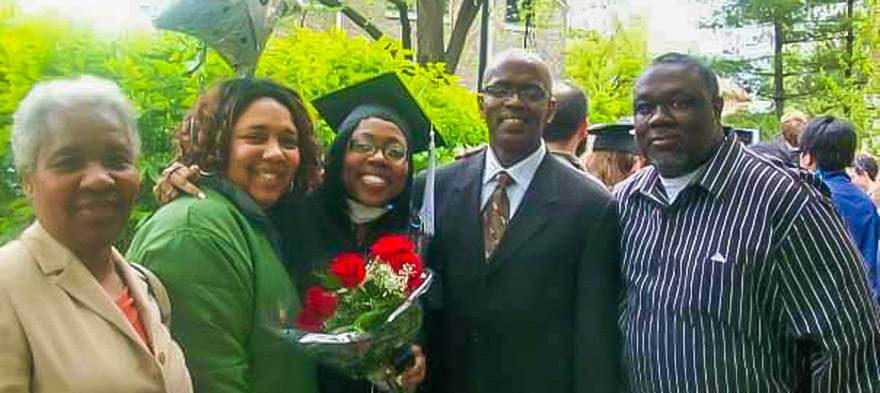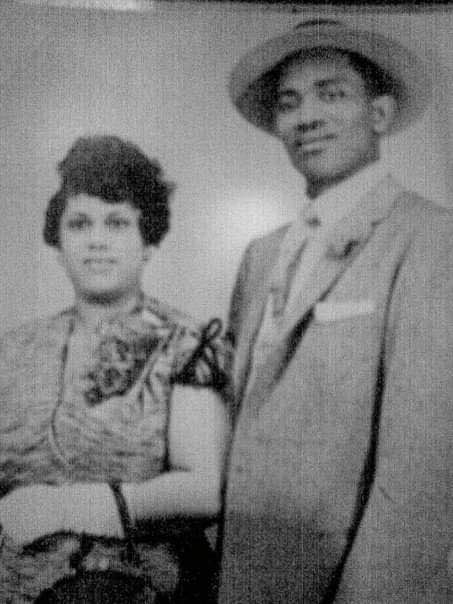
May 26, 2016 12:00:00 AM
 My grandparents traveled from Mississippi to Chicago during the Great Migration. My grandfather, Robert Thompson, was a hard worker who took a job at a meat factory and also drove a pickup truck collecting odd objects he would sell along the way. My grandmother stayed at home, tending to their four boys. My father graduated from what was known as Englewood High back in the day. He didn’t go to college. Instead he worked two jobs. After marrying my mother, I came along one year later. To sustain his family, my father joined the Chicago Fire Department. My mother attended beauty school and eventually taught cosmetology at Truman College on the North Side of Chicago. Neither one of them received a college education, but I always knew I would go to college. Maybe it was the fact that I was encouraged by the historical figures I learned about who paved the way for me to receive a decent education. Or maybe it was my love for “A Different World,” which was the first television show to highlight Black students attending college. I can’t put my finger on it, but I always knew I’d be a college graduate. The road was not easy. At all. We stumbled our way through paperwork, financial aid and choosing courses. It was intense, but I never thought about quitting. My first semester of college was spent at Columbia College Chicago. I was doing well in the beginning, but when I realized I wouldn’t be returning the next semester due to a lack of finances, I slipped into a depression and failed to finish my first semester strong. The next semester was spent in bed, watching Oprah and feeling sorry for myself. I admired Oprah and wanted to follow in her footsteps, but I didn’t have any resources to help me along the way. But I realized that my education would be my link to success and opportunities. So I enrolled in my local junior college, completed two semesters, and enrolled in North Park University on the North Side of Chicago. Attending a predominantly white institution (PWI) was difficult at times. There were many days I left the financial aid office in tears. I saw African-American students come and go. They were first-generation students as well. At many times I felt like I was behind, and I was, but my faith sustained me, giving me strength to endure. Graduation day was super emotional. As I sat in the crowd of my White peers wearing our caps and gowns, tears slowly streamed down my face. My grandfather worked himself sick and eventually passed away from cancer when I was 12 years old. This day was for him. My parents never had a college education, but they made sure I would be the one to break the cycle. They were in the audience beaming with pride over their first born. This moment was for them. It blows my mind that there are still first-generation students in 2016, but I’m also well aware of the obstacles that prevent many from obtaining a degree. And to that I say, in the words of Frederick Douglass: “Without struggle, there is no progress.” You can do it. People are depending on you.
My grandparents traveled from Mississippi to Chicago during the Great Migration. My grandfather, Robert Thompson, was a hard worker who took a job at a meat factory and also drove a pickup truck collecting odd objects he would sell along the way. My grandmother stayed at home, tending to their four boys. My father graduated from what was known as Englewood High back in the day. He didn’t go to college. Instead he worked two jobs. After marrying my mother, I came along one year later. To sustain his family, my father joined the Chicago Fire Department. My mother attended beauty school and eventually taught cosmetology at Truman College on the North Side of Chicago. Neither one of them received a college education, but I always knew I would go to college. Maybe it was the fact that I was encouraged by the historical figures I learned about who paved the way for me to receive a decent education. Or maybe it was my love for “A Different World,” which was the first television show to highlight Black students attending college. I can’t put my finger on it, but I always knew I’d be a college graduate. The road was not easy. At all. We stumbled our way through paperwork, financial aid and choosing courses. It was intense, but I never thought about quitting. My first semester of college was spent at Columbia College Chicago. I was doing well in the beginning, but when I realized I wouldn’t be returning the next semester due to a lack of finances, I slipped into a depression and failed to finish my first semester strong. The next semester was spent in bed, watching Oprah and feeling sorry for myself. I admired Oprah and wanted to follow in her footsteps, but I didn’t have any resources to help me along the way. But I realized that my education would be my link to success and opportunities. So I enrolled in my local junior college, completed two semesters, and enrolled in North Park University on the North Side of Chicago. Attending a predominantly white institution (PWI) was difficult at times. There were many days I left the financial aid office in tears. I saw African-American students come and go. They were first-generation students as well. At many times I felt like I was behind, and I was, but my faith sustained me, giving me strength to endure. Graduation day was super emotional. As I sat in the crowd of my White peers wearing our caps and gowns, tears slowly streamed down my face. My grandfather worked himself sick and eventually passed away from cancer when I was 12 years old. This day was for him. My parents never had a college education, but they made sure I would be the one to break the cycle. They were in the audience beaming with pride over their first born. This moment was for them. It blows my mind that there are still first-generation students in 2016, but I’m also well aware of the obstacles that prevent many from obtaining a degree. And to that I say, in the words of Frederick Douglass: “Without struggle, there is no progress.” You can do it. People are depending on you.
Tanikia Carpenter blogs about schools and life on Chicago’s South Side at Chicago Unheard. Her work has been featured on the TLC network, ESSENCE, and Huff Post LIVE, just to name a few. Tanikia is a regular contributor to Black & Married With Kids and the columnist of JET Magazine's "Giving You the Gospel." She is also the author of "When God Said Yes" and "The 30 Day Man Fast."
The story you tell yourself about your own math ability tends to become true. This isn’t some Oprah aphorism about attracting what you want from the universe. Well, I guess it kind of is, but...
If you have a child with disabilities, you’re not alone: According to the latest data, over 7 million American schoolchildren — 14% of all students ages 3-21 — are classified as eligible for special...
The fight for educational equity has never been just about schools. The real North Star for this work is providing opportunities for each child to thrive into adulthood. This means that our advocacy...
Your donations support the voices who challenge decision makers to provide the learning opportunities all children need to thrive.
Ed Post is the flagship website platform of brightbeam, a 501(c3) network of education activists and influencers demanding a better education and a brighter future for every child.
© 2020–2024 brightbeam. All rights reserved.
Leave a Comment